| Annual Newsletter of the Slavic Research Center,
Hokkaido University |
||
| No.14
, December 2006 |
back to INDEX>> | |
| Sergei Kozlov |
Póti László |
Hokkaido is an ideal place to observe Russia especially for a Hungarian researcher. For, it is the other end of the vast Eurasian space called the Russian Federation. It provides a very different perspective in comparison to looking at Russia from Central Europe. For example, from here you can actually see Russia across the sea. I happened to do so when we made an excursion to the Shiretoko-Peninsula. After having survived the visit in Bearcountry at the famous five lakes, we saw part of the Russian bear called Kunashir from a viewing point on one of the mountains of the peninsula. There is a direct sense of the legacy of World War II, Kunashir being under Russian rule, while it is only a short distance from East Hokkaido. The close coastal proximity of Russia was highlighted by a recent incident in which a Japanese fisherman was killed by a Russian patrol in disputed waters.
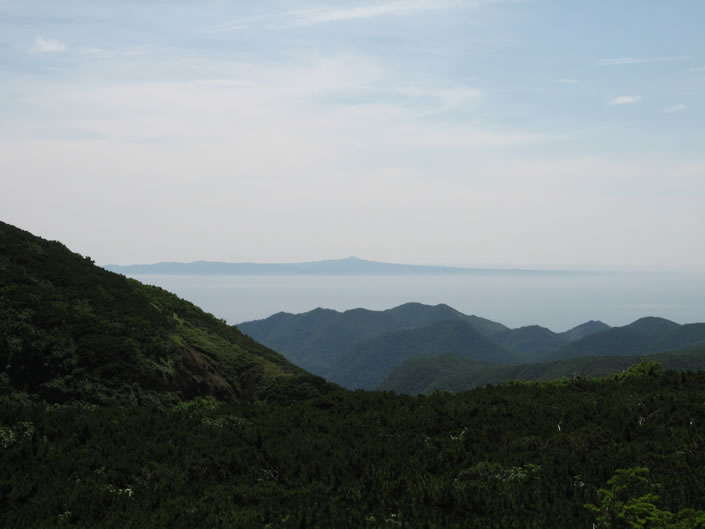 |
|
The view of Kunashir from
Hokkaido
|
For the close observer of Russian affairs, 2006 has been a year of tremendous change, signaling a qualitatively new phase in Russian foreign policy. There are three new aspects to Russian foreign policy: the forming of a new Russian national ideology, the new emphases of Russian global foreign policy and the radical shift in the Russian CIS-policy.
As to the first, deputy prime minister, and defense minister Sergey Ivanov who is among the possible successors of Putin, made public the basis of the new Russian national ideology. It is composed of three main components: sovereign democracy, strong economy and robust military force. "Sovereign democracy" as originally coined by Vladislav Surkov, the main Kremlin ideologist, in order to counter Western criticism on the state of affairs of Russian democracy usually referred to as a "managed democracy." Sovereign democracy means, first of all, a special Russian model of democracy, and secondly this concept holds that there is no political sovereignty without economic sovereignty. As to the latter, it does not exemplify isolationism, according to Surkov economic sovereignty should be used to integrate Russia into the world economy. Although the other deputy prime minister and possible successor of Putin, Dmitry Medved’ev distanced himself from the expression "sovereign democracy" – claiming that any adjective used before the word "democracy" suggests a lack of genuine democracy –, it seems that this concept will form the elite's new ideological stance (the pro-presidential leading party will most probably incorporate this notion into its program before the upcoming parliamentary elections in 2007).
Incidentally, the growing self-confidence of the Russian leadership was illustrated at the recent G-8 meeting in St. Petersburg, when Putin cuttingly responded to Bush's wishing Russia the same kind of democracy as Iraq by answering "we would not like to have such democracy as in Iraq."
In 2006, Russian foreign policy has emphasized:
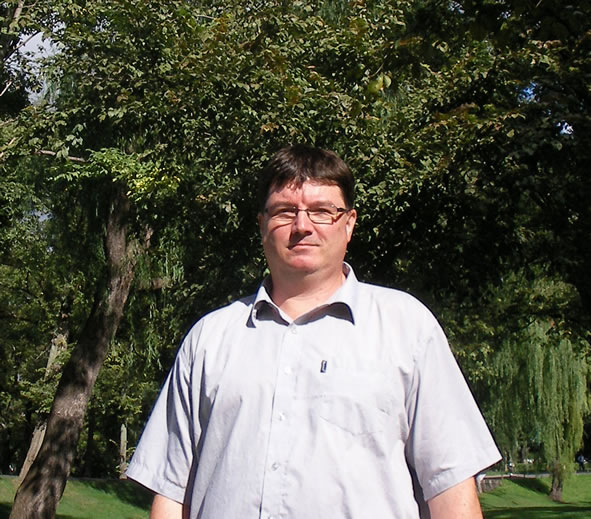 |
|
The author on the campus of
Hokkaido Univ.
|
As to the new balance of power with the United States, this is not a completely new aspiration of Moscow, but Putin outlined the new stance during the Russian ambassadors' meeting this summer "the principle 'what is permitted to Jupiter is not permitted to an ox' is unacceptable for Modern Russia."
As to new arms control talks with the United States, Putin considered the post-cold war era as a period of stagnation and called for a new round of such negotiations.
Increased importance of military force, has been on the rise since the publication of the so-called Ivanov-doctrine1 in 2003, but this years presidential message to the parliament indicated for the first time that Russian armed forces should be capable of fighting simultaneously at three levels: globally, regionally and in local conflicts.
Having Russia recognized as an energy superpower by the outside world has been one of the most successful foreign policy achievements of Moscow in recent years. In spite of the fact that Russia’s membership of the WTO is still pending, and that Moscow is still not inclined to ratify the Energy Charter with the EU, Russia has established herself more broadly as a superpower, leaving behind the era when she was only a military superpower.
The "no compromise" Russian approach on territorial issues is focused on the Russian Far East. Moscow has settled all major territorial disputes, or minimized them with almost all its major and minor neighbors in Europe and in Asia, so the only remaining problem of this kind remains with Japan. There are three indications that Moscow has rejected any compromise solutions to the issue of the "northern territories." Firstly, Moscow has publicized grand investment plans for the Kurile Islands and Sakhalin, secondly, the first ever sizable (5,000 troops) strategic military exercise was organized in Kamchatka Peninsula – an exercise that is emphatically not an antiterrorist exercise. Thirdly, the Russian border patrol reacts harshly with Japanese ships in the disputed waters.
Moscow's radical shift in policy in the post-Soviet era is also highlighted by its response to regional conflicts and its pricing of energy supplies. Firstly, the Russian policy of maintaining the status quo in the frozen conflicts of the region changed after the declaration of independence by Montenegro. Now, Moscow has publicly indicated that these frozen conflicts should be resolved by referenda, thus changing the decade and a half long status quo. Secondly, the cost of Russian energy supplied to the post-Soviet region used to be held below world market prices for political reasons (i.e. to promote loyalty to the soviet regime). Announcing a radical departure from this approach Putin proposed at the ambassadors' conference this summer to switch to "principles applied in the world economy and trade." The switch to a market economy basis in energy pricing is a brand new policy in the post-Soviet region and reflects Moscow's economic rather than purely ideological aims.
In sum, the above-described changes that have newly become dominant features of Russian foreign policy, indicate that Russia's role in world politics should be revaluated. Russia is no longer a declining, disintegrating country with a permanent identity crisis. Instead, Russia is playing an increasingly important role in international politics, as an evolving great power with an ever clearer identity, a stronger economic basis, clear in its ambitions, and able to assert them more effectively.
*******19 June 2006 – Getting acquainted with life in Sapporo
... Today I read some basic information about life in Sapporo in the booklet entitled „Handbook for daily life” that was given to me by the local administration with the aim of helping foreigner to be accommodated. First of all, it turned out that Sapporo is located at the same latitude as Rome, but the climate is very different. The brochure said that four seasons follow each other – not a big novelty for me coming from a continental country - with „cool summer and snowy winter”. Summer high is in August, Winter low is in January, the average temperature being 20 and -3 degrees respectively. In other words: Hungary+snow=Hokkaido. For that matter, Sapporo is exactly of the size of Budapest in terms of population with 1.8 million inhabitants ... There were also some useful suggestions what to do in case of earthquake, what to shout in case of fire, or how to arrange marriages and funerals ...
5-6 August 2006. - life-threatening excursion to the East
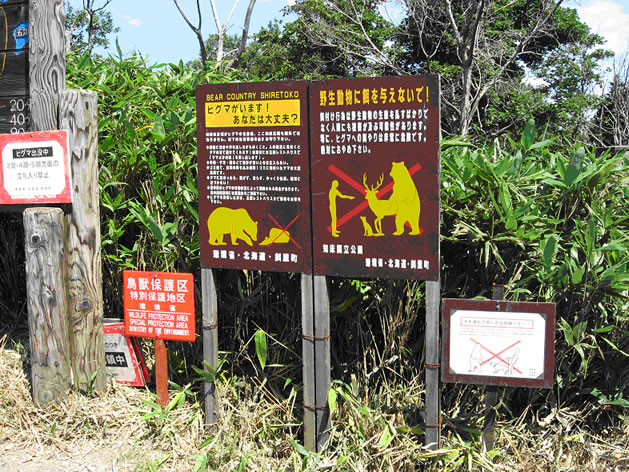 |
... We went on a 2 days tour to Shiretoko-peninsula. Besides the ice-pavilion (minus 40 degrees inside), beautiful waterfalls on our way to the Abashiri prison, the deepest impression was made on me by the presence of bears in the region. When we arrived at Abashiri, our guide called the foreign guests and asked us not to use perfume next morning in order to avoid the bears’ attention. We were told that about 500 grizzlies live here in the national park freely. We had to believe it, because on the side of the road there were signs showing walking bears (like at home the sign with deers signaling that they may cross your way). Next day we stopped at the famous 5 lakes and the sign below was the one we faced before taking a walk there. We were in “bear country”, so I asked the guide if there would be bears, and she answered “possibly, maybe” (a phrase that heard so much later, maybe became a key word in Japanese communication with me) ...
25 August 2006 – tastes of the local food store
... My Japanese friend accompanied us to the nearest big food store Daichi in order to get us – with Sergey-san from St.Petersburg - acquainted with some local food. Among the most interesting things was the salted plum. I bought a portion and ate it but I admit I disliked it. Further, there was rice with bean which people eat at outstanding occasions, like when a girl has the first menstruation, as we were told. Even if I had no such outstanding apropos, I tried this one as well, and it tasted OK. In connection with rice we were also told that there were two kinds: one that has to be washed with pressing it hard, and the one that needs not to be washed in this pressing manner. We were also told that rice is not a side dish, but a complete dish on its own merits (even for breakfast) ...
26 September 2006 – the attack of the killer crow
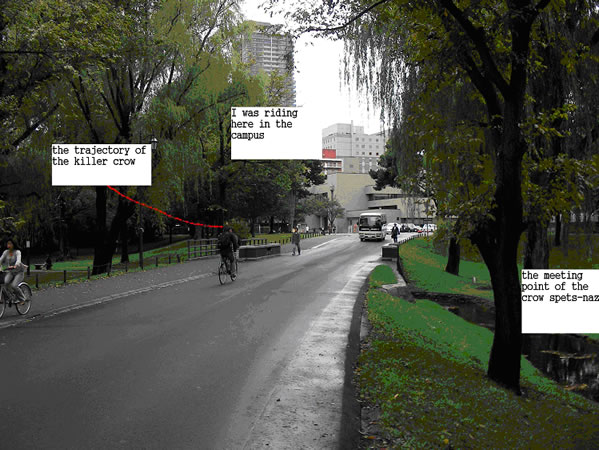 |
... I was riding my bike at around 4 pm on the campus and all of a sudden I felt that something touched my head from the back. When it happened again I understood that I AM THE VICTIM OF A CROW ATTACK. I got off began shouting and the stuff flew away. At this moment I saw another cyclist being attacked by another crow. It happened to me in spite of the fact that it was not the typical season of crow attacks (when they give birth to the young), I was not standing near to nest, and neither was I eating some attracting food. But that day the crows simply went crazy. The attack was not strong, I did not feel pain, it was rather a gesture like „go way, please”, but the physical contact was very strange with the bird. Below is the reconstruction of this criminal act:
25 October 2006 – Japan overwrites the universal laws of mathematics
...Today I went to the local Coop shop to buy 2 bottles of Ginger ale for the movie were going to watch in the lounge in the evening. I took two bottles - the price on the shelf of each of them was 100 yen -, I went to the cash desk and confidently put 200 yen on the plate, but the cashier told me it was 201. OK, I paid but I did not understood how 100+100=200. Later I returned back for checking what happens if I buy one piece. This time I paid 100 yen. So if I buy the 2 bottles one by one I could save 1 percent of one’s price. Strange, it seems that this country stands above the universal laws of mathematics ...
1 November 2006. – The first earthquake of my life
...There was an earthquake yesterday. I was reading when at around 11.30 pm it began to tremble. It was not long and strong but was very scary. I ran to the window to see what local people do, but nobody surfaced, so after half an hour I went to sleep ...
9 November 2006 – Some missing information from the fellowship application form: threat perception in Hokkaido
... In order to help those aspiring to apply for fellowship in
Sapporo,
I enlist the security risks that I have experienced in Hokkaido. As I
deal with security policy, I feel like my obligation doing so  )):
)):
|
14 November 2006 – a note on the cyclists of Sapporo
... The Sapporo cyclist typically:
|
30 November 2006 - icycle
... Winter has come, but I still use my bike even on snowy icy roads. This kind of bicycle was called one of the readers my diary:
| icycle |
I loved it ...
8 December 2006 – life in the conbini
… The Japanese conbini is not a simple small store at the corner, it offers a number of services what we do not have at home. To put it short you could live here a year or so without any bigger difficulties. Its basic function is to provide food and other stuff for immediate needs, but, in addition:
|
23 December 2006 – a home definition of Japan
... I loved Asakusa, I went there twice during my stay in Tokyo. It was there – besides Kyoto – where I could feel, smell, touch the old traditional Japan. Not in the shrines, or on the main commercial street, but rather in the narrow streets where I had lunch among ordinary people who were chatting and following the horse races excitedly examining their bets. But, the traditional Japan is withering away, and the new one is not at all to my taste. Too much virtuality, too many lights, too much consumerism. Sad but true, I summarized my perception of Japan in the seventh month of my stay paraphrasing the Leninist formula1:
| state capitalism + electrification of the whole country = Japan ... |
16 January 19 – Japan goes nuke (maybe?)
... As a by-product of my stay here, I have written a small piece on the radical shift of Japanese security policy, here are the introductory words:
| The forging threshold-country: the shift of Japanese security policy Japan celebrated the Coming-of-the Age Day on 8 January 2007. On 9 January, for the first time in the post-war history Japan has a ministry of defence. With this symbolic step Japan began moving forward on the road to its full-scale „coming-of-the-age” in terms of security policy, including the possibility of going nuclear. … |
20 February 19 – the ninformation society
After all the difficulties experienced here in connection with obtaining the necessary information in due time and in a precise manner, I created the pattern of Japanese ninformation flow.
|
20 January 19 – farewell party
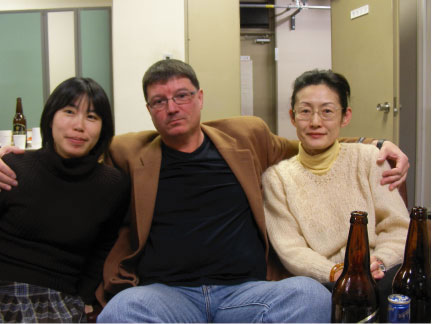 |
… There was a farewell party at the center today. We, the three foreign visiting professors received beautiful boxes as present, and had great food and good beer. According to the Slavic tradition we delivered “tosts” before drinking. When it was my turn, I said the following: I have been to many parts of the world already with fellowships for shorter or longer term – in Stockholm, at Stanford in California, in Paris, in Germany, in Wassenaar in the Netherlands – but, all in all, this Sapporo fellowship was the best of my life. On the picture bellow with my dear colleagues you can see on my face already the sadness that I will miss this place so much. Sayoonara SRC!
 |